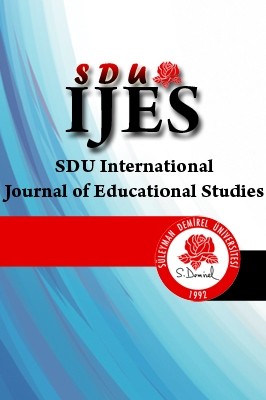Öğretmen Gözünden Öğrenci Direncine Bakış: Görüşleri, Stratejileri ve Önerileri
Direnç davranışları, Öğrenci direnci, Ortaokul, Öğretmen, Öğrenci
Look on Student Resistance from the Eyes of Teachers: Opinions, Strategies and Recommendations
Resistance behaviours, Student resistance, Secondary school, Teacher, Student,
___
- Alpert B. (1991). Students' resistance in the classroom. Anthropology & Education Quarterly, 22(4), 350-366.
- Argon, T., & Sezen-Gültekin, G. (2016). Pedagogical formation students' resistance behaviors towards teaching-learning processes and their moral maturity. Universal Journal of Educational Research 4(12A), 16-21. DOI: 10.13189/ujer.2016.041303
- Burroughs, N.F., Kearney, P. & Plax, T.G. (1989). Compliance-Resistance in the college students. Communication Education, 38, 214-229.Cakir, S. G. (2015). The effects of teacher immediacy and student burnout on empowerment and resistance among Turkish pre-service teachers. Learning and Individual Differences, 40, 170-175.
- Chory-Assad, R. M. (2002). Classroom justice: Perceptions of fairness as a predictor of student motivation, learning, and aggression. Communication Quarterly, 50, 58–77.
- Chory‐Assad, R., M. & Paulsel, M., L. (2004) Classroom justice: student aggression and resistance as reactions to perceived unfairness, Communication Education, 53:3, 253-273, DOI: 10.1080/0363452042000265189
- Gjesfjeld, C. D. (2014). Meeting Student Resistance with Empathic Teaching in the College Classroom. Gauisus, 2, 1-8. https://gauisus.weebly.com/gjesfjeld---empathic-teaching.html
- Goodboy, A. K. & Bolkan, S. (2011). Leadership in the college classroom: the use of charismatic leadership as a deterrent to student resistance strategies. Journal of Classroom Interaction, 46, 4–10.
- Kearney, P., Plax, T. G., & Burroughs, N. F. (1991). An attributional analysis of college students' resistance decisions. Communication Education, 40(4), 325-342. Koyuncu, B. (2017). Lise öğrencilerinin problem çözme becerilerinin derslere yönelik direnç davranışlarının yordanması. International Journal of Eurasia Social Sciences, 8(29), 1071-1090.
- Miles, M. & Huberman, M. (1994). Qualitative data analysis. USA: Sage Publications.
- Moore, H. A. (2007). Student resistance in sociology classrooms: Tools for learning and teaching. Sociology Department, Faculty Publications 88, 28-44. http://digitalcommons.unl.edu/sociologyfacpub/88 31 ocak 2019
- Sarı M., "Öğretmen algılarına göre ilkokul öğrencilerinde direnç davranışları: Sessizce planlanan meydan okuyuşlar", 5. Uluslararası Eğitim Programları ve Öğretim Kongresi’nde sunulan sözlü bildiri, 26-28 Ekim 2017, vol.1, pp.644-645, Marmaris, Muğla
- Sever, D. (2012). İlköğretim fen ve teknoloji dersinde araştırma temelli öğrenme yaklaşımının öğrenci dirençlerine etkisi. Yayınlanmamış doktora tezi, Anadolu Üniversitesi Eğitim Bilimleri Enstitüsü, Eskişehir.
- Sever, D. & Güven, M. (2014). İlköğretim fen ve teknoloji dersinde araştırma temelli öğrenme yaklaşımının öğrenci dirençlerine etkisi. Kuram ve Uygulamada Eğitim Bilimleri Dergisi, 14(4), 1583-1605.
- Seidel, S. B. & Tanner, K. D. (2013). “What if students revolt?”—Considering Student Resistance: Origins, Options, and Opportunities for Investigation. CBE—Life Sciences Education, 12, 586–595.
- Spaulding, A. M. (1995). A qualitative case study of teacher-student micropolitical ınteraction: The strategies, goals, and consequences of student resistance. Paper presented at The American Educational Research Association Annual Conference, San Francisco, 18-22.
- TDK (2018). Türkçe Sözlük. Direnç. http://www.tdk.gov.tr/index.php?option=com_gts&arama=gts&guid=TDK.GTS.5b2d6247df4c86.58783982. Erişim tarihi: 23.06.2018.
- Wells, H., Jones, A., & Jones, S. C. (2014). Teaching reluctant students: using the principles and techniques of motivational interviewing to foster better student–teacher interactions. Innovations in Education and Teaching International, 51(2), 175-184. http://dx.doi.org/10.1080/14703297.2013.778066.
- Yüksel, S. (2003). Öğrencilerin öğretme-öğrenme sürecine yönelik direnç davranışları. Uludağ Üniversitesi Eğitim Fakültesi Dergisi, 17(1), 235-251.
- Başlangıç: 2014
- Yayıncı: Süleyman Demirel Üniversitesi
6. Sınıf Işık ve Ses Konusuna Yönelik Başarı Testi Geliştirme Çalışması
Sinan YANAR, Aslı SAYLAN KIRMIZIGÜL, Hasan KAYA
Nihan ERDEMİR, Gonca YANGIN EKŞİ
Parents' Educational Expectations: Does It Matter for Academic Success?
E.nihal LİNDBERG, Erdal YILDIRIM, Özlem ELVAN, Dürdane ÖZTÜRK, Serpil RECEPOĞLU
Bağlam Temelli Öğretimin Öğrencilerin “Yeşil Kimya Ve Sürdürülebilirlik” Algıları Üzerine Etkisi
Zafer KARAGÖLGE, İlhami CEYHUN, Nermin ARICI
Sınıf Öğretmenliği Öğrencilerinin Kopya Çekme Tutumları, Görüşleri ve Benlik Saygısının İncelenmesi
Öğretmen Gözünden Öğrenci Direncine Bakış: Görüşleri, Stratejileri ve Önerileri
The Effect of Explicit Feedback in Oral Performance in Use of Past Tense
Kübra ŞENDOĞAN, Mukaddes ÇOBAN, Dilay İşık KİRİŞCİ, Simay ULUSCU, Mustafa POLAT
